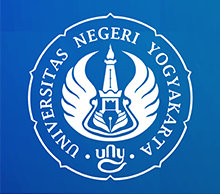Keywords
career development, electronics engineering, mobile career learning
Document Type
Article
Abstract
The objective of this study is to develop a mobile career learning model for electronics engineering vocational high school and reveal the feasibility of the developed mobile career learning model to develop electronics engineering vocational student's competencies. This research utilized research and development method that refers to the Holistic 4D model, includes four stages of development: define, design, develop and deploy with three levels of holistic design and an interactive cycle, namely analysis, design, and evaluation. The define stage includes the performance analysis observations and instructional needs assessment. The design stage includes the design evaluation stage which involves expert with the background of lecturers, principals, teachers, career experts, software experts and successful alumni. The develop stage involves a review of material experts and media experts as well as a limited trial involving students and teachers of electronics engineering vocational high school. The data collection used observation sheets and questionnaires that have been validated by experts. The data analysis used the descriptive method. The results of the study are as follows. (1) The developed mobile career learning model integrates vocational learning activities and career guidance by utilizing information technology in the form of mobile career learning media applications. (2) The developed mobile career learning model is feasible and can be used for career development of students with electronics engineering competence.
First Page
27
Last Page
40
Page Range
27-40
Issue
1
Volume
7
Digital Object Identifier (DOI)
10.21831/elinvo.v7i1.44425
Source
https://journal.uny.ac.id/index.php/elinvo/article/view/44425
Recommended Citation
E. Nurdianah and P. Sudira, "Developing Mobile Career Learning Model for Electronics Engineering Vocational High School,", vol. 7, no. 1, pp. 27 - 40, Dec 2022.
The definitive version is available at https://doi.org/10.21831/elinvo.v7i1.44425
References
Republik Indonesia, Undang-Undang RI No. 20 Tahun 2003 tentang Sistem Pendidikan Nasional. 2003.
P. Sudira, TVET Abad XXI: Filosofi, Teori, Konsep, dan Strategi Pembelajaran Vokasional. Yogyakarta: UNY Press, 2017.
M. Pavlova, Technology and Vocational Education UNESCO-UNEVOC Book Series Technical and Vocational Education and Training : Issues , Concerns and Prospects. Springer, 2009.
Kemendikbud, Perdirjen Dikdasmen No. 06/D.D5/KK/2018 tentang Spektrum Keahlian SMK. 2018.
Presiden Republik Indonesia, "Peraturan Pemerintah Republik Indonesia Nomor 17 tahun 2010 tentang Pengelolaan dan Penyelenggaraan Pendidikan," 2010.
B. Vermeulen, J. Kesselhut, A. Pyka, and P. P. Saviotti, "The impact of automation on employment: Just the usual structural change?," Sustain., vol. 10, no. 5, pp. 1-27, 2018, doi: 10.3390/su10051661.
K. Das, P. Wibowo, M. Chui, V. Agarwal, and V. Lath, "Automation and the Future of Work in Indonesia," McKinsey Co., no. September, pp. 21-28, 2019.
N. Veronica, E. Purwanta, and B. Astuti, "Design and development of a mobile learning for career planning in senior high school," Int. J. Sci. Technol. Res., vol. 9, no. 1, pp. 908-913, 2020.
Badan Pusat Statistik, "Statistik Telekomunikasi Indonesia," 2018, [Online]. Available: https://www.bps.go.id/publication/
H. H. Ho, R. Mohd Rasdi, R. Ibrahim, and M. N. Md Khambari, "Developing and evaluating the effectiveness of mobile phone-based career intervention for career competencies of Malaysian public managers: Protocol for a mixed method study," Internet Interv., vol. 22, no. September, p. 100349, 2020, doi: 10.1016/j.invent.2020.100349.
C. M. Reigeluth and Y. An, Merging The Instructional Design Process With Learner-Centered Theory: The Holistic 4D Model. New York: Routledge, 2021.
P. A. Ertmer and T. J. Newby, "Behaviorism, cognitivism, constructivism: Comparing critical features from an instructional design perspective," Perform. Improv. Q., vol. 26, no. 2, pp. 43-71, 2013, doi: 10.1002/piq.21143.
P. Sudira, TVET ABAD XXI Filosofi, Teori, Konsep dan Startegi Pembelajaran Vokasional, vol. 91, no. 5. 2017.
M. K. Williams, "John Dewey in the 21st Century," J. Inq. Action Educ., vol. 9, no. 1, 2017, [Online]. Available: https://files.eric.ed.gov/fulltext/EJ1158258.pdf.
M. L. Savickas and E. J. Porfeli, "Career Adapt-Abilities Scale: Construction, reliability, and measurement equivalence across 13 countries," J. Vocat. Behav., vol. 80, no. 3, pp. 661-673, 2012, doi: 10.1016/j.jvb.2012.01.011.
A. Glassner and S. Back, Exploring Heutagogy in Higher Education. Singapore: Springer Nature Singapore, 2020.
Z. Polkowski, R. Jadeja, and N. Dutta, "Peer learning in technical education and it?s worthiness: Some facts based on implementation," Procedia Comput. Sci., vol. 172, no. 2019, pp. 247-252, 2020, doi: 10.1016/j.procs.2020.05.039.
M. L. Bernacki, J. A. Greene, and H. Crompton, "Mobile technology, learning, and achievement: Advances in understanding T and measuring the role of mobile technology in education," Contemp. Educ. Psychol., vol. 60, 2020, doi: 10.1016/j.cedpsych.2019.101827.
R. W. Lent, "Future of Work in the Digital World: Preparing for Instability and Opportunity," Career Dev. Q., vol. 66, no. 3, pp. 205-219, 2018, doi: 10.1002/cdq.12143.
R. W. Lent and S. D. Brown, "Career decision making, fast and slow: Toward an integrative model of intervention for sustainable career choice," J. Vocat. Behav., vol. 120, no. December 2019, p. 103448, 2020, doi: 10.1016/j.jvb.2020.103448.
R. Li and Z. Ren, "Mechanism of Career Construction Facing The Human-Machine Interaction," in IEEE 4th Advanced Information Technology, Electronic and Automation Control Conference (IAEAC), 2019, pp. 2677-2680, doi: 10.1109/IAEAC47372.2019.8997807.
M. Muresan, "Using Cybergogy and Andragogy Paradigms in Lifelong Learning," Procedia - Soc. Behav. Sci., vol. 116, pp. 4722-4726, 2014, doi: 10.1016/j.sbspro.2014.01.1015.



